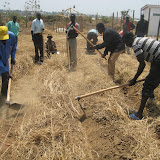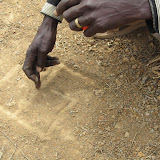Frustration. I've been thinking about frustrations this week. The rainy seasons adds an element of unpredictability to each day. Boo and Phyllis and Diantha and I took a chance and planned a trip to Goli, mainly so that Faustino and Peter could check out the pastor training program and take an oral test of their English ability. But it rained especially heavily the day before, so the roads were even more of a muddy mess than usual (see photos.) We almost got stuck (that made the folks in our Landcruiser tense); and the doctor driving the Evangelical Presbyterian Church car did get stuck, we had to pull him out. My most frustrating time in Sudan so far was the Sunday before, when I slipped and fell twice in the mud while on the motorcycle. I wasn't physically hurt, but arrived at Morre UMC very muddy and feeling upset and humiliated. It was a gift of grace that the church members at Morre didn't seem to mind how I looked, and asked me to preach anyway. Then I spent a couple days inside with some kind of stomach flu. About midway through the week someone remarked on how much suffering the Sudanese people we know put up with, on a regular basis. We know so many with malaria, typhoid, serious injuries, who keep working right through because they have to. They routinely walk long distances, carry unbelievably heavy loads, and do hard physical labor in the hot climate (see photo of Nyoka). I started thinking about how insignificant my frustrations really are; and how much we who are here from outside Sudan need to do a better job of "getting over it", spending less time complaining and letting small things restrict our activities. When I get my attitude adjusted to the reality of the lives of people here and the bigger context of where God is at work and my place in that, many of the things I think matter turn out not to matter: being muddy doesn't matter; being embarrassed doesn't matter; and its not the end of the world to feel sick.
Scale. I've spent most of the week at home, working on a couple funding applications that could help us address health, sustainable farming, and building churches and schools on a larger scale over several years. Writing proposals is a familiar activity for me, one I feel confident I can do, but I feel uneasy. I know from experience that it's so easy (especially for me) to be focused on large schemes to impact many people, that I'm not spending as much time being available for encounters with individuals, for building relationships. On the other hand, I see the real temptation as missionaries to be so caught up in responding to a string of crises that individuals have, one person after another, that we don't take the time to figure out and make the changes on a larger scale to remove the causes of these crises. It's like the hospitals in the Congo that Dr. Dan Fountain told us about (in the Health and Agriculture Workshop I took last April) that are so busy with treating patients with problems like roundworms, they don't think they have time to develop a community health outreach that would greatly reduce the roundworm problem by increasing handwashing and latrine usage. So is the answer to find a balance between the large scale and the small scale, some way of doing both? Do each of us here doing mission need to seek that balance in our own service, somehow? I worry if we settle for doing one or the other, because I know clearly for myself that I need to leave myself open to the personal encounters that make the work here real, and yet I would really hope that we missionaries would not miss the forest for the trees, that we would stretch our minds to seek what can be changed on a larger scale to make health and livelihoods better for these very people and many more like them that we may never encounter, but whom God loves too?
Giving. The question for me is not whether to give; I/we have so much, and clearly God wants us to share it with those who have so little. But the questions are how much to give, how and when to give, for what purposes, and what does it do to the people we give to? I've read a whole book on this (African Friends and Money Matters) and been here two months and it seems like I ought to have a better handle on this, but I don't. After talking with two Sudanese colleagues who work for another NGO, I understand from them that many Sudanese formed their attitudes about getting money from foreigners in the refugee camp experience; it was an extremely lopsided relationship in which the NGOs were set up to give away stuff, and the refugees had nothing and little opportunity to earn/farm anything for themselves. For me the challenge is somehow to share the abundant resources I have in a way that doesn't simply reinforce this dynamic. A few ways that might work are (1) providing part but not all of the cost of something (tools, seeds, medicine, etc.) (2) investing in someone's training especially when they have a clear commitment to put it to work to benefit others. (3) providing the staffing that makes a beneficial development program possible, but expecting the participants to cover most or all of the other program costs. I'd like to figure out some more.
Monday, October 18, 2010
Subscribe to:
Post Comments (Atom)
















No comments:
Post a Comment